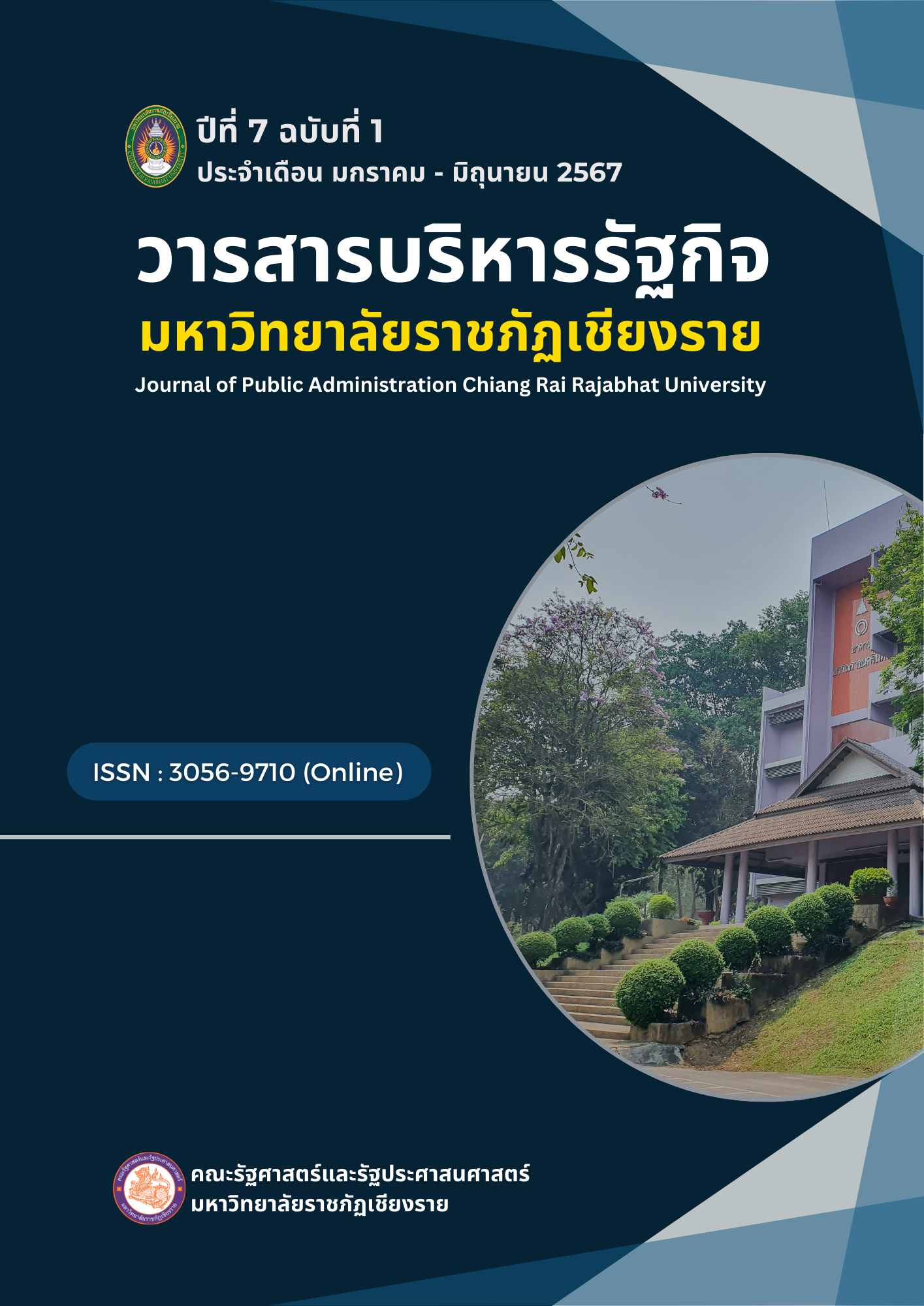Social Innovation and Human Resource Management for Inclusion of Vulnerable Groups in the Context of the Elderly and Disabled
Main Article Content
Abstract
This academic article aims to explore the challenges and needs of the elderly and people with disabilities in the current Thai social context, with an emphasis on creating social innovations and managing human resources to effectively and efficiently respond to these target groups. The article seeks to explore approaches and strategies for creating new opportunities and channels for the elderly and people with disabilities to promote their full participation in society. The study found that Human Resource Management (HRM) plays a crucial role in supporting and driving social innovations for the elderly and people with disabilities through key components, including personnel recruitment and selection processes, policy development and practices, career advancement support and development, as well as continuous evaluation and improvement. Establishing clear and effective HRM strategies to promote social innovations can create tangible positive outcomes for the quality of life and well-being of the elderly and people with disabilities. Furthermore, this academic article opens up new perspectives on creating an inclusive, equitable, and sustainable society by promoting the participation and access to resources for the elderly and people with disabilities. Pushing forward in this direction will not only help create opportunities and equality but also strengthen society as a whole. Therefore, this article is not merely a compilation and analysis of problem-related data, but also aims to synthesize knowledge and social innovations to establish best practices for the development and support of vulnerable groups in society in the future.
Article Details
References
Adla et al. (2020). Human resource management and innovation in SMEs. Personnel Review, 49(8), 1519-1535.
Ayoko, O. B. (2021). SMEs, innovation and human resource management. Journal of Management & Organization, 27(1), 1-5.
Bataglin, J. C., & Kruglianskas, I. (2022). Social innovation: Field analysis and gaps for future research. Sustainability, 14(3), 1153.
Bondarouk, T., & Olivas-Lujan, M. R. (Eds.). (2014). Human resource management, social innovation and technology. Emerald Group Publishing.
Campopiano, G., & Bassani, G. (2021). Social innovation: Learning from social cooperatives in the Italian context. Journal of Cleaner Production, 291(3) 125253.
Charoenluk N. (2023). Research and Development of Volunteer Networks for Enhancing the Health of Vulnerable Groups in Communities. Rajabhat MCR Peace Studies Review, 11(3), 848-861.
Charoenrat, S. (2021). Developing Technology, Facilities, and Audiobook Innovations to Reduce Inequality for the Disabled and Underprivileged in Society. Sri Lanchang Review, 7(2), 1-22.
Chiarajit, C. (2022). Social Innovation and Sustainable Community Livelihood Network Development. Rajabhat MCR Social Sciences Review, 11(2), 1-8.
Chiarajit, C. (2022). Towards an Aging Society: Social Innovations and Strengthening Networks for Elderly Development in Thai Society. Journal of Social Development and Administrative Strategies, 24(1). 49-67.
Chuasuwan, T., & Chansamdee, R. (2023). Challenges and Issues for People with Disabilities and Their Caregivers During the COVID-19 Pandemic. Journal of Social Welfare Studies, 31(1), 118-155.
Dias, J., & Partidário, M. (2019). Mind the gap: The potential transformative capacity of social innovation. Sustainability, 11(16), 4465.
Khruthamamash, A. (2023). A Study on the Employment Outcomes of Social Innovation Foundations According to Life Quality Development Standards for the Disabled. Journal of Roi Kaen Sarn Academi, 8(10), 707-718.
Kruaephat, K. (2021). The Initiation of Change by Leaders: Key Factors of Leadership Success in Developing Social Innovations for Model Communities. Thammasat University Journal of Arts, 21(2), 409-433.
Mahardhani, A. J. (2023). The Role of Public Policy in Fostering Technological Innovation and Sustainability. Journal of Contemporary Administration and Management (ADMAN), 1(2), 47-53.
Matwangsaeng, P. (2020). The Impact of Strategic Human Resource Management on Organizational Performance in Thai Higher Education Institutions. Journal of Research and Development Institute Rajabhat Maha Sarakham University, 7(1), 473-486.
Phantalae, P. (2023). Thai Social Inequality in the Era of New Normal Life. Mahamakut Buddhist University Journal of Social Sciences, 5(2), 185-200.
Phonsuphap, T., & Kraseasinsin, R. (2021). The Transition to Digital Labs and Changing Roles in Human Resource Management. Sakthong: Journal of Humanities and Social Sciences, 27(1), 1-19.
Pongsuwan, P. (2023). Three Core Principles for Human Resource Management in the Digital Age. Rajabhat Interdisciplinary Innovation Review, 6(2), A74-A88.
Promsut, T. (2022). Development Models of Human Resources in the Era of Thailand 4.0 for Provincial Industrial Offices. Journal of Innovation in Management and Administration, 10(3), 11-22.
Pungvivatnikul, W. (2019). Human Resource Management in the Context of Future Thai Workforce in the Digital Technology Era. Rajabhat MCR Buddhist Wisdom Review. 4(2), 285-298.
Rasool, S. F., Samma, M., Wang, M., Zhao, Y., & Zhang, Y. (2019). How human resource management practices translate into sustainable organizational performance: the mediating role of product, process and knowledge innovation. Psychology research and behavior management, 12, 1009-1025.
Saktrakul, S. (2023). Organizational Management for Security Based on Human Resources. Rajabhat Interdisciplinary Innovation Review, 6(3), 90-103.
Song, W., Yu, H., & Xu, H. (2021). Effects of green human resource management and managerial environmental concern on green innovation. European journal of innovation management, 24(3), 951-967.
Tupanich, W., & Wongsawat, P. (2023). A Prevention Model for the Risks of Depression among Older Adults with Non-Communicable Diseases. Doctoral dissertation. Phitsanulok: Naresuan University.
Watthanabutr, B. (2019). Potential of Human Resources by the Private Sector to Create Learning Innovations for Sustainable Development in the 21st Century. Rajabhat MCR Social Sciences Review, 8(4), 191-200.


